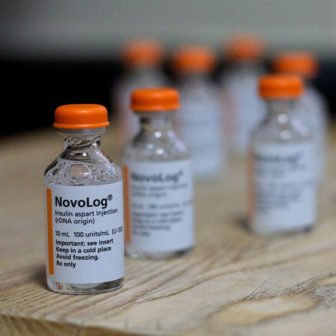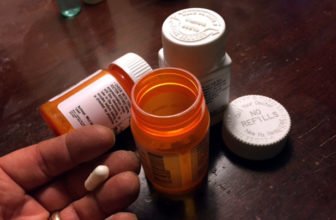In a Short Session, Lawmakers Eye Prescription Drug Proposals

Audio By Carbonatix

Some residents have had to ration insulin and other drugs because they could not afford to pay the high cost of their prescriptions. Image courtesy of CTMirror.org
Legislators say drug efforts will be the centerpiece of their health reform agenda.

Bills planned for next year would address drug importation, drug formularies and pay to delay, among other issues. Image courtesy of CTMirror.org
By Jenna Carlesso, CTMirror.org
Kristen Daniels remembers rationing her insulin after she turned 26 and could no longer stay on her parents’ insurance. For months the Shelton resident, who has Type 1 diabetes, took reduced doses to prolong her supply until she found a community health clinic that helped her get the drug at a steep discount.
Serenie Cohen needed a brand name antidepressant to balance the potent side effects of her multiple sclerosis medication. The 63-year-old couldn’t afford her $400-a-month prescription, so she found a way to order it from Canada – for $20 a month – until her insurance later relented and agreed to cover it.
“You feel helpless,” said Laurence Cohen, who lives with his wife in West Hartford. “There are a lot of drugs that are extraordinarily expensive.”
These are among the cases that lawmakers and advocates say have inspired them to take aim at the high cost of prescription drugs in the upcoming legislative session, which begins in February.
With a limited time frame – officials have only three months to move bills through the General Assembly next year – lawmakers say the drug initiatives are some of the most crucial but workable proposals in a short session, and will become the centerpiece of their health care reform efforts.
Rep. Sean Scanlon, a co-chairman of the legislature’s Insurance and Real Estate Committee, spent his summer and fall hosting roundtable discussions across Connecticut on the affordability of medication. In every town Scanlon visited, residents spoke of the barriers to obtaining life-saving drugs.
“Whether I’m in Canaan or Ansonia, the story is the same,” he said. “People are fed up with the high cost of drugs and they want us to act. Every time they do one of these forums, person after person gets up and tells a story.”
Efforts next year will likely include exploring drug importation from Canada, tackling the rising price of insulin, the formation of a drug review board, banning a practice known as “pay to delay” – which postpones the introduction of cheaper, generic drugs into the market, and placing a prohibition on mid-year changes to drug formularies.
Scanlon said he’s heard countless frustrations about the price of medication on the campaign trail. Legislators are up for re-election next year, and Scanlon wants to use that as fuel for winning bipartisan support on the drug proposals.
“I and other people are going to make prescription drugs a litmus test for every candidate running for office in 2020,” he said. “After the session wraps up, I’m going to go around the state and make sure this is the most important issue that people are talking about and being held accountable to. And if they are not willing to support an agenda that furthers affordable, accessible health care, I don’t think that they should be supported” for re-election.
Drugs from abroad
The importation of prescription drugs from Canada is one of the most buzzed-about health care plans under the gold dome in Hartford.
Proponents tried to push the issue through last spring in a watered-down version of a public option bill, but the measure died in the Senate. They are poised to revive it this winter.
No one knows yet exactly how much money could be saved by shipping drugs in from Canada, though lawmakers have pointed to statistics showing medications there are 30% to 50% cheaper than those currently sold in the United States. Others have said the U.S. spends 30% to 190% more on prescription drugs than other developed countries.
Federal law permits the importation of drugs from Canada only if it poses no public health or safety risk and results in reduced costs. The law allows state agencies, wholesalers and pharmacists to import drugs under certain conditions with approval from the federal Department of Health and Human Services.
Four states have recently passed legislation allowing them to seek federal authorization and set up programs – Vermont, Colorado, Florida, and Maine.
Each plan differs. Vermont, which was first to adopt the law, intends to establish a state program that will act as a drug importing wholesaler. Lawmakers there are still trying to find a way to fund it, and have not yet sought federal approval.
Colorado officials this year passed a law requiring the state’s health care policy and financing department to run a drug importation program. Under the proposal, medication must be tested for authenticity and the supply chain must be documented. Pharmacies and wholesalers that provide drugs to Medicaid recipients and inmates would qualify, along with private commercial plans and pharmacists approved by the department.
Last month, the state unveiled a detailed proposal that features 65 drugs, including asthma, HIV and hormonal therapies, as well as EpiPens. Officials are expected to submit the document to the federal HHS agency in January, though it could be years before a program is off the ground.
Maine this year also greenlighted a measure that directs its health and human services department to design a program and apply for federal approval. A separate, yet-to-be-named state office would act as the importer and contract with distributors, pharmacies and insurers. Legislators there are looking for a way to finance the initiative.
In Florida, lawmakers signed off last spring on a plan for two programs: One involved importing drugs from Canada and a second called for drugs to be brought in from unspecified countries to be chosen later. The Florida Agency for Health Care Administration would run the Canadian drug program, contracting with a vendor and reporting annually to the governor and legislature.
Under the second initiative, pharmacists and distributors could import drugs from any qualified jurisdiction. Exporters would have to apply for and receive a permit from the Florida Business and Professional Regulation Agency, and importers would be required to maintain supply chain documentation.
Both need approval from the federal HHS department.
The Trump administration in July took its first tentative steps toward allowing the importation of certain drugs from Canada. The plan includes two scenarios – one in which states, wholesalers or pharmacists could submit proposals for test projects on how they would import medication approved by Health Canada, and another that would enable manufacturers to import lower-cost versions of the drugs they sell in foreign countries.
The administration puts the burden on states and manufacturers to convince it that importing drugs would be safe for consumers and save them money. For example, it would be up to states to negotiate with Canadian authorities to allow their drugs to be sent to the US. The plans have not been finalized.
Legislators in Connecticut are still exploring what a program might look like here. Saving money and imposing standards of quality are key priorities.
“There are real things we need to work out on Canadian drugs,” said Sen. Matthew Lesser, who co-chairs the insurance committee with Scanlon. “We know we need to ensure patient safety, but are we going to get the savings and are we are going to be able to pass it along to the consumers? That’s what I’m focused on.”
“We know that drugs are far cheaper in Canada,” he said, “so the assumption is, if you provide cheaper drugs in the marketplace in Connecticut, that will get passed on to consumers.”
Other initiatives
Rounding out the prescription drug agenda are proposals that would halt so-called bad practices by insurers and manufacturers.
Two measures that failed to make it through the General Assembly this year are expected to resurface in 2020. One would target “pay for delay,” a practice that involves brand name drug makers compensating their generic counterparts for holding off on marketing their versions of the medications – causing longer delays in getting less expensive, generic drugs to the pharmacy counter.
Legislation that failed this year would have required brand name drug companies that enter into those settlements with generic drug corporations to offer 50 percent discounts on their prescription medications – a penalty meant to discourage the practice.
The other proposal would ban mid-year or mid-contract changes to formularies – the lists of prescription drugs that health plans will cover. In Connecticut, insurers may remove drugs from a formulary during a policy’s term.
“They can at no notice just take a drug off your formulary list in the middle of the year,” Scanlon said. “So we’re looking at a bill that would ban that.”
A similar effort was unsuccessful last spring.
Lawmakers are also examining legislation passed in Maryland that created the nation’s first Prescription Drug Affordability Board, which will review expensive prescription drugs and could cap how much public agencies will pay for them.
The law puts pressure on drug makers by requiring them to justify certain prices or price increases for patented and generic drugs. If the board rejects a manufacturer’s explanation for a pricing decision, it can, with the approval of the state legislature, set a lower price for the drug. The Maryland law applies only to health plans that serve state, county and city employees.
Scanlon said legislators have not settled on specifics for a Connecticut proposal. But a panel here would be composed of experts and staffed by Gov. Ned Lamont and the General Assembly.
A last, critical piece of the health agenda would involve tackling the soaring cost of insulin, though officials have been tight-lipped about what that plan would entail.
Scanlon hinted that it could include a cap on the price of the drug, and a mechanism to give people emergency access if they can’t otherwise get insulin. Lawmakers are looking at ways to help uninsured or underinsured residents obtain the drug, he said.
While drafts of the new legislation have not yet surfaced, the proposals are already ruffling some feathers.
Susan Halpin, executive director for the Connecticut Association of Health Plans, which lobbies on behalf of insurers, said flexibility on drug formularies allows carriers to filter medications in and out depending on cost and quality.
“If a manufacturer, for instance, knows that we can’t change the formulary for an entire year, what are they going to do on Jan. 1? Are they going to jack up the price overnight and say, ‘OK, they can’t do anything about it until next January?’” she said.
Halpin noted that there are protections in place, including informing consumers if drugs are removed or added to the formulary. State law also prohibits insurers from denying coverage for drugs that are removed from the list if a person’s physician states in writing that the drug is medically necessary and indicates why it is more beneficial than others on the formulary.
Leaders of the Connecticut Business and Industry Association have also raised concerns about several of the proposals, including prescription drug importation. Health officials in the U.S. won’t be able to guarantee the quality of drugs shipped from Canada, they said.
“There are so many issues with drug importation, most notably the safety issue. It’s impossible to determine the safety of medicines coming in from Canada – or anywhere – that don’t go through the FDA monitoring process,” said Paul Pescatello, a lobbyist for CBIA.
The organization also opposes the pay-for-delay measure, saying it flouts manufacturers’ right to contract with one another.
“We’ll be looking at it really carefully,” Pescatello said. “We’re skeptical of whether state legislation can really stop the practice without impairing that right to contract.”
More to come
While next year’s health reforms may have a narrower focus, several lawmakers said they will aim higher should they return in 2021.
The controversial proposal to expand government-run health coverage – in the form of a public option – is still favored by its proponents, though many have conceded it would face a difficult if not impossible road in 2020. Some predicted a revival in 2021.
Others want to resurrect a plan that would allow residents to obtain a drug discount card through the comptroller’s office. The cards would provide an average savings of 30% on brand name prescription drugs, and would be part of the state’s pharmacy contract.
A bill on that issue didn’t win approval this year.
“We’re still looking for ways to change how health care is provided in Connecticut to give residents more options and lower the cost of insurance,” Lesser said. “Those conversations are ongoing with stakeholders.”
Outside of prescription drugs, legislators will look at the feasibility of a reinsurance program, cost growth benchmarking and surprise medical bills in 2020. They also are expected to take up the contentious issue of repealing the state’s religious exemption from mandatory vaccinations.
But some of the more sweeping reforms will be left for the following year.
“There are a number of us who want to make health care the biggest issue that we tackle in 2021,” Scanlon said. “The 2020 session is going to be the appetizer to the entrée. And to have that entrée in 2021, we need a legislature full of people who are not afraid to take on powerful special interests and do the right thing for the people of Connecticut.”
Reprinted with permission of The Connecticut Mirror. The author can be reached at [email protected].
Like what you see here? Click here to subscribe to We-Ha’s newsletter so you’ll always be in the know about what’s happening in West Hartford!



